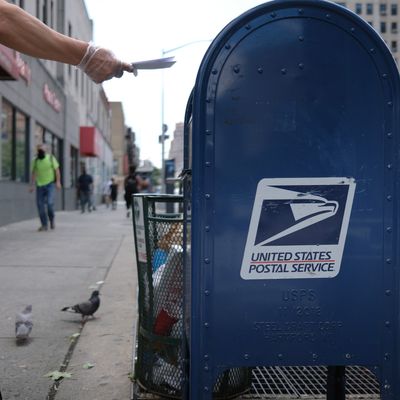
The Trump administration’s practice of axing officials on Friday nights continued this week at the United States Postal Service, when Postmaster General Louis DeJoy revealed in a memo that the leadership of the mail service’s day-to-day operations would be completely transformed. According to the Washington Post, 23 USPS executives have been “reassigned or displaced” in an apparent effort to provide DeJoy with more power over operations.
The memo obtained by the Post appears to be designed to further undermine the ability of the Postal Service to operate during the pandemic: In addition to shifting several career officials out of leadership roles, the USPS will implement a hiring freeze and request voluntary early retirements. DeJoy, a master of aimless corporate language, wrote to employees that the shift is designed to “realign the organization to provide greater focus on the core aspects of our business and to give us a better chance for future success.” Representative Gerald Connolly, the chair of the House subcommittee overseeing the USPS, felt differently, calling the change “deliberate sabotage.”
Since DeJoy — a supply-chain executive and extremely generous Republican donor — was appointed postmaster general in May, he’s enacted many changes that appear to be intended to undercut the ability of the nation’s mail service to deliver the mail. In an effort to reduce costs, last month, carriers were instructed to “leave mail behind at distribution centers” if the packages would slow down the delivery process. Overtime, often necessary for the day’s workload to be finished, was also eliminated. Prior to the leadership switch-up, Democratic lawmakers were already calling for the Postal Service inspector general, Tammy Whitcomb, to investigate DeJoy’s new process. The decision announced Friday will certainly boost those calls.
While Trump has been decrying the Postal Service for years, the timing of the changes is cause for alarm, considering the president’s false inflation of the threat of mail-in voter fraud in an election that will be reliant on mail-in ballots. With a political donor running the post office — a rarity for an agency historically run by USPS lifers — Trump now appears ready and willing to slow the service to a crawl while disorienting its leaders with drastic personnel changes. As New York’s Adam Raymond notes, the president’s rough plan of attack appears to be to weaken the mail service, “then [use] that weakness as a reason to argue against mail-in voting.”
Trump’s demonization of the absentee vote may create a crisis in November if the delays currently swamping the nation’s post offices lead to mass disenfranchisement and mail-in ballots don’t arrive in time. As the Trump campaign sues the state of Nevada for providing no-excuse absentee ballots to all residents, Republican voters have also been slow to accept such an expansion of the mail-in vote. One ABC News/Washington Post poll released in July showed that 78 percent of the president’s supporters consider mail-in ballots as “vulnerable to significant levels of fraud,” while another from the Pew Research Center last month showed that 83 percent of Democrats approved of no-excuse absentee voting, compared to just 44 percent of Republicans. Such a dynamic could set up chaos in November if the president’s efforts result in a wave of in-person Republican ballots on which Trump claims an early victory, followed by a blistering campaign of discrediting mail-in votes for Biden as a fraudulent product of a failing Postal Service. (That the administration compromised the agency rather than aiding it might not make the cut of this hypothetical narrative.)
Though the administration appears to be setting up that very disaster scenario, the GOP isn’t betting everything on USPS breakdown to spoil the pandemic necessity of the mail-in ballot. As Democrats advocate for a $25 billion boost to the Postal Service in the coming stimulus package, Politico reports that the Republican National Committee and the Trump campaign have spent $20 million in their legal efforts to limit voting by mail in battleground states including Minnesota, Pennsylvania, and Nevada.






























